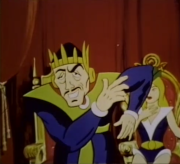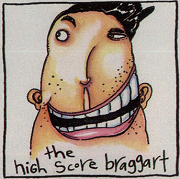|
The minor pentatonic scale uses the: Root, minor third, fourth, fifth and minor seventh These don't change when shifting between the minor modes, so you can play a minor pentatonic on top of any minor mode. The major pentatonic scale uses the: Root, second, third, fifth and sixth These don't change when shifting between the major modes, so you can play a major pentatonic on top of any major mode.
|
|
|
|

|
| # ? May 19, 2024 05:47 |
|
That's the whole point of pentatonics I guess. Also the major pentatonic is just a restatement of the minor pentatonic for the parallel minor key, and vice versa, if that's not already obvious. Failed Imagineer has a new favorite as of 18:48 on Oct 15, 2022 |
|
|
|
Failed Imagineer posted:That's the whole point of pentatonics I guess. Oh yeah, I know. I just never stopped to think about why it worked.
|
|
|
|
Locrian has something to say to that no it doesn't locrian isn't a real mode
|
|
|
|
I decided to do some reading up on it on Wikipedia and came across what I'd just figured out but also three other pentatonic scales I'd never heard mentioned (major and minor blues and suspended) I tried playing them out and, of course, they're just the other three modes of the pentatonic and I'd already known the patterns for years
|
|
|
|
Here's a fun one to twist yer noodle: the black keys on a piano are also the pentatonic modes.
|
|
|
|
Also how you do pinch harmonics on gueeter
|
|
|
|
Baron von Eevl posted:Here's a fun one to twist yer noodle: the black keys on a piano are also the pentatonic modes. Yeah it's fun to (badly) fake being able to play piano, just by using guitar skills to run some arpeggios up the black keys
|
|
|
|
Captain Splendid posted:The minor pentatonic scale uses the: Baron von Eevl posted:Here's a fun one to twist yer noodle: the black keys on a piano are also the pentatonic modes. KoRMaK has a new favorite as of 02:46 on Oct 16, 2022 |
|
|
|
The black keys form a pentatonic shape, if you want to do C major pentatonic it would be a tritone down from the black keys. edit specifically they're Gb pentatonic major, Eb pentatonic minor
|
|
|
|
I don't get any of this music poo poo. My old boss had a degree in music theory and he tried explaining it, but I could never understand why there was eight of them. Or why they repeat. Or why we just don't just use like Hz or something
|
|
|
|
We do! A=440hz
|
|
|
|
Brawnfire posted:We do! A=440hz Oh don't you start
|
|
|
|
Gaius Marius posted:I don't get any of this music poo poo. My old boss had a degree in music theory and he tried explaining it, but I could never understand why there was eight of them. Or why they repeat. Or why we just don't just use like Hz or something I only get like a fifth of the music poo poo I want to, but what I do know is that one note that's an octave higher than another note is, in actual fact, double the frequency. For whatever reason, we perceive the same frequency but double (or half) as "the same thing but higher (or lower)". As far as I understand, from there it's mostly a question of how you decide to split up the frequency range between octaves. For whatever reason, Western music tradition has settled on 13 small steps, and from there into 8 bigger steps, some of which are one small step and some of which are two small steps (don't ask me why). As far as I know other traditions split it up differently, but I think "double the frequency means the same note up an octave" is universal. Hyperlynx has a new favorite as of 10:04 on Oct 16, 2022 |
|
|
|
Hyperlynx posted:As far as I understand, from there it's mostly a question of how you decide to split up the frequency range between octaves. For whatever reason, Western music tradition has settled on 13 small steps, and from there into 8 bigger steps, some of which are one small step and some of which are two small steps (don't ask me why). 12 and 7, not 13 and 8. Here's the breakdown: Human hearing is logarithmic in pitch; in other words, 100 Hz sounds as different from 150 Hz as 1000 Hz does to 1500 Hz, even though the absolute difference in frequency is much larger for the latter pair. A note that is twice the frequency as another note sounds like the same note to our ears, because their higher harmonics overlap. In music notation, we call those the "same note" but at different "octaves." So you have a series of notes, like F#0, F#1, F#2, etc. that are all twice the frequency of the previous. This range from one note to another is split, exponentially (to accommodate our logarithmic hearing) more or less (more on this later), into twelve steps. Why twelve? This was all finalized by a bunch of old european dudes, and they designed it so that certain simple ratios, such as 3:2 or 4:3, could be represented in the sequence of notes, because they knew that plucked strings with those ratios of lengths sounded harmonious together. For example, G3 is about 196 Hz, and C3 is about 130.8 Hz, for a ratio of about 3 to 2. The human brain likes these particular pairs of notes, because their harmonics overlap somewhat (but not as much as notes that are the "same note"). Pairs of notes are called "intervals," and they are named stupidly. The 2:1 pair is called a "perfect eighth" or "octave," though it has nothing to do with the number eight (more on that in a moment), and the 3:2 pair is a "perfect fifth," and so on. The notes are labeled A, A#/Bb, B, C, C#/Db, D, D#/Eb, E, F, F#/Gb, G, G#/Ab. And then they repeat in that sequence. Some of them have two names and there are two conspicuous "gaps" for some reason. A "key signature" or "scale" is made out of a group of (usually) seven of those notes that, together, make harmonious music. For example, C major is C, D, E, F, G, A, and B, which is all the "natural" (i.e. not sharped or flatted, it's a dumb name) notes. If you take a starting note and the eleven other notes above it, a "major" scale consists of the first, third, fifth, sixth, eighth, tenth, and twelfth note in that sequence (and then repeats starting with the first). And the seven remaining notes are given roman numeral names - I through VII. The second most common kind of scale is the "minor" scale, in which III, VI, and VII are lowered by one note. So traditional music theory is based around these sets of seven. If you go one note further, to the eighth note which is the repeat of the first, and play the first and eighth at the same time, that's an "octave" or "perfect eighth," because the higher note is seven major-scale-notes higher than the lower note, or in other words, twelve notes higher overall (great naming system, huh?). For that reason, each set of those seven notes at higher or lower pitches is also called an "octave," because there are seven of them. Great naming conventions, european dudes. To make matters worse, two notes that are right next to one another are called a "half step," because they're one entire note apart, and two notes two apart are called a "whole step." You will notice that in a scale, the seven steps from one note to the next (including from the last note to the same-note-but-one-octave-higher) are 5 "whole steps" and 2 "half steps" in order to span the twelve "half steps" of a full "octave." Groups of three or more notes that harmonize together are called "chords," but I'm not going to get into that because that's a whole nother thing. So, mathematically, why the whole "octave" business with 12 notes? It's because 27/12 is very close to 3/2 (the "perfect fifth" of two notes separated by 7 out of 12 steps), and 25/12 is very close to 4/3 (the "perfect fourth", five out of twelve steps), which were the simple ratios that the old european dudes wanted to preserve in their musical notation. There's also the "major third," 24/12 ~= 5/4. Go twelve steps, 212/12, and you've got a ratio of 2/1, the "octave." If you choose some other number of logarithmically-spaced notes for each octave, then you don't get good ratios. To standardize things, the note "A4" is set to 440 Hz, and all other notes can be derived relative to it; for example, a "major third" up from A4 is C#4/Db4, which is ~550 Hz. So there, finally, is your answer to "why there was eight of them." There wasn't, there was twelve, and sometimes we pick out a special group of seven. And there's twelve because that gives you evenly spaced notes that also sound good because some of them (very nearly) make simple ratios in their frequencies. But it's all been obscured by very bad naming conventions invented by a bunch of weird old musicians who didn't know how to count. One last footnote: I mentioned that the exponential spacing of notes is only "more or less" true. It sometimes is; if you tune an instrument to follow that mathematical structure I just described, it's called "equal temperament," and all key signatures will sound equally good on the instrument. But sometimes people tune an instrument to more perfectly reflect the simple ratios that sound most harmonious; i.e. making the "major third" exactly 1.25 instead of 1.2599. The downside of this is that the ratios may be off even further if you do not play the particular key signature that the instrument is tuned for. "Temperament" is a whole rabbit hole with more really weird naming conventions; I would advise not looking into it. I mention it only for completeness. Sane musicians use equal temperament.
|
|
|
|
Baron von Eevl posted:The black keys form a pentatonic shape, if you want to do C major pentatonic it would be a tritone down from the black keys. ah thank you DontMockMySmock posted:12 and 7, not 13 and 8. Here's the breakdown: quote:
very good post will read it again. music theory is worse than programming languages - a bunch of esoteric knowledge that won't make sense until it suddenly does
|
|
|
|
KoRMaK posted:music theory is worse than programming languages I'll say! I'm a programmer, not a musician...
|
|
|
|
That's because programming languages are designed to be functional and so programs can be made from them. Theory is people taking something that sounds good and trying to figure out why it works.
|
|
|
|
Music theory is just sound assembly code. Makes complete and total sense if you are an old man who designed the tool back in the day otherwise it's sheer nonsense you force yourself to understand.
|
|
|
|
Wait, are you singing mixolydian scales or something?
|
|
|
|
Ommin posted:Wait, are you singing mixolydian scales or something?
|
|
|
|
Ommin posted:Wait, are you singing mixolydian scales or something? Nice
|
|
|
|
Melaneus posted:Nice It is always the first thing that comes to mind when music theory is discussed. lol I freely admit my ignorance of the subject and applaud anyone that understands it, but it sounds like nonsense to me (much like programming). I still find it kind of fascinating to see you all go through motions though.
|
|
|
|
What's the reference? The hat thing just reminds me of cannibal the musical
|
|
|
|
Milo and POTUS posted:What's the reference? The hat thing just reminds me of cannibal the musical That's the one. It's right after the Trapper song; they are arguing about singing in the wrong key and it turns into a music theory debate.
|
|
|
|
SAP is German, that's why: KR's are invoices (Rechnung) KG's are credit notes (Gutschrift) KZ's are payments (Zahlung)
|
|
|
Ommin posted:That's the one. It's right after the Trapper song; they are arguing about singing in the wrong key and it turns into a music theory debate. The best part is that in the drunken commentary (which is phenomenal ), they try to point out how they flubbed the line and got the theory part wrong, and it just causes them to drunkenly argue about the exact same music theory
|
|
|
|
|
Music theory is easy. Bass players can understand music theory, that's how easy it is.
|
|
|
|
Bass players are the most studious of musicians because you know they ain't having sex
|
|
|
|
stratdax posted:Music theory is easy. Bass players can understand music theory, that's how easy it is. They understand the roots, perhaps
|
|
|
|
I played cello for six years and understand none of this, I could have just played bass instead??
|
|
|
|
Dip Viscous posted:I played cello for six years and understand none of this, I could have just played bass instead?? When you're young and playing a classical instrument like that you're just given other people's music to play, so there's no need. I played violin for 7 and never learnt a 10th of the theory I know now.
|
|
|
|
That's exactly what made me quit, though. I realized I was just parroting things with zero understanding of what I was actually doing.
|
|
|
|
Dip Viscous posted:That's exactly what made me quit, though. I realized I was just parroting things with zero understanding of what I was actually doing. Same, I played cello and viola from 3rd grade to my senior year, typically first or second chair in whichever section, and then I just never touched them again. I don't really know how to read music (by this point I've forgotten how to even interpret music into finger positions the way I used to) and I don't understand any of the theory. I really wish we changed the way we do orchestral (and band? idk) instruction in the US.
|
|
|
|
It's a crime that people who get a classical education in music don't learn how to jam or write songs. So many skilled players out there who just kinda stop pursuing it after high school because they never learn the joy of just making music with your pals.
|
|
|
|
My 16-year-old son refused to learn to properly read music when he was younger, but he’s a very skilled musician who can play multiple instruments. Occasionally he comes up with a music theory lightbulb moment on his own and I am like “maybe you should actually learn the theory and become even more versatile” But alas. He is a teenager. He really didn’t like HS band after a while because he didn’t like just playing band music with no rhyme or reason. He much prefers just jamming for hours.
|
|
|
|
A fact I learned today on these very forums is that "cenobites" is actually just a general term for members of a particular religious community. So all those weirdos in Hellraiser weren't given a made-up name that sounded cool, it's just an actual term that describes their nature as basically being dimension-traveling monks.
|
|
|
|
The app icon on my phone for the clock displays the correct time.
|
|
|
|
Captain Splendid posted:The app icon on my phone for the clock displays the correct time. My daughter (5) excitedly pointed this out to me just recently. It's pretty cool.
|
|
|
|

|
| # ? May 19, 2024 05:47 |
|
Imperador do Brasil posted:My 16-year-old son refused to learn to properly read music when he was younger, but he’s a very skilled musician who can play multiple instruments. Occasionally he comes up with a music theory lightbulb moment on his own and I am like “maybe you should actually learn the theory and become even more versatile” But alas. He is a teenager. I only started really properly learning music theory around 5 years ago and I've been playing since I was 10. I wish I started sooner because it's so useful even for a permanently intermedia player like me.
|
|
|


































